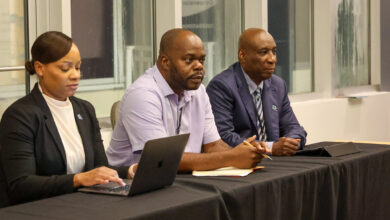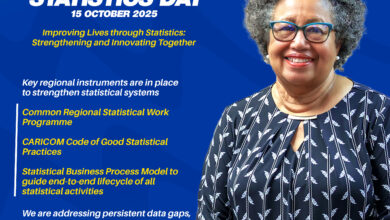Mr. Chairman
Distinguished Heads of Government
Other Members of the Board of Governors
Members of the Board of Directors
Mr. President of the CDB
Directors and Officers of the Bank
Observers
Ladies and Gentlemen
I am indeed pleased to be afforded the opportunity to address this 35th Annual Meeting of the Board of Governors of the Caribbean Development Bank (CDB), and I offer you our congratulations on attainment of this milestone. In biblical terms, 35 years represent half a lifetime, but for Christians and non-Christians alike, the CDB represents a lasting commitment to serve the development needs of current and future generations throughout our Caribbean Community.
The CDB's sister organisation, the Caribbean Community (CARICOM) Secretariat, has been in existence for virtually a similar period of time. The relationship between the two Regional institutions can be characterised as one of close cooperation in the promotion and deepening of the integration process and the pursuit of Caribbean economic development and social prosperity. This nexus between the two respective organisations is epitomized in the work and the persona of the late William Demas, who led both organisations, first as CARIFTA/CARICOM Secretary-General from 1970 to 1974 and then as CDB President from 1974 to 1987.
Today, the need for cooperation between the two institutions is greater than ever. The liberalisation and globalisation processes threaten the preferential market access for almost all our traditional commodity exports and the multilateral trading rules of the game are a challenge even for certain sunrise activities. Efficient management of the required adjustment process is critical, especially as our small economies enter into various multilateral, hemispheric and Regional trade and partnership arrangements. Also, while we remain highly susceptible to external shocks, our vulnerability to natural hazards continues to increase with global warming. In these circumstances, the financing role of the CDB is of utmost importance to our survival and development.
Our response to these circumstances – the Regional integration process – is at a critical juncture: Having virtually completed the process for the coming into being of the Single Market by the end of 2005, we have now entered the rather more difficult phase of transition to a Single Economy. This requires a certain pooling of sovereignty and a creative form of Regional governance as we attempt to harmonise our monetary, financial, fiscal, investment and other macro-economic policies as well as develop our various sectoral policies. We might have chosen, as some have argued, the difficult path of “an association of sovereign States”, but for now, it may well be our only possible path! Moreover, effect rather than form is our objective.
The CDB is one of the key sister organisations collaborating with the CARICOM Secretariat in devising the Regional measures and mechanisms for this further stage of the deepening of the integration process. There is no doubt that its contributions to the deliberations and work of the Ministerial Council for Finance and Planning (COFAP) and the Heads of Government Conference are very much appreciated.
Earlier this year, in Trinidad and Tobago, we saw the inauguration of the Caribbean Court of Justice, an institution whose original jurisdictional functions are crucial to the interpretation of the Revised Treaty of Chaguaramas establishing the Caribbean Community including the Single Market and Economy. This momentous achievement was in no small measure due to the innovative work of the Caribbean Development Bank in acquiring the US$100 million to establish the Trust Fund, the proceeds from which would be used to finance the Court in perpetuity. The CDB is to be sincerely commended for its critical role in putting in place this unique and widely admired method of ensuring the independent financing of this Court, a pillar of the CSME.
Ladies and Gentlemen, there is an adage that says the reward for good work is more work. This aphorism holds true even for the CDB. One of the mechanisms for enhancing the CARICOM Single Market and Economy, as mandated in Chapter 7 of the Revised Treaty of Chaguaramas is the establishment of a Development Fund to treat with the problems of disadvantaged countries, regions and sectors. The CDB was requested, and kindly accepted the responsibility for designing the operational framework for this Fund.
The recommendations for the establishment and operation of the Fund are going to be discussed by The Council for Finance and Planning, (COFAP) at its Tenth Meeting on Friday and Saturday of this week. These recommendations include a suggested contribution level that is similar to the EU structural fund rate of 0.35% of the Regional GDP. Using 2003 as a base year, this rate of contribution would yield US$120M, a figure that is about 20% more than the annual average loan and grant disbursement by CDB in recent years. This level of annual contribution is probably well beyond the collective capacity of CARICOM at this point in time, given our very tight fiscal situation, and so, a special resource additionality appeal, may have to be made to the donor community.
The tremendous importance of the CARICOM Development Fund cannot be over-emphasised. Our Region, as we all know, is characterised by considerable disparity in per capita income between countries, and there is not much evidence that this disparity is diminishing as a result of the normal operations of the market place. The Fund is therefore designed to deal with the phenomenon of low levels of development, sectoral and enterprise dislocation relating to the operations of the CSME as well as the social and economic disorder of natural disasters.
There is also significant disparity within CARICOM countries, which is reflected in persistently high levels of poverty. While the CARICOM Development Fund would be a very important addition in the fight against underdevelopment, there is no lessening of the need for the Bank to bolster the poverty reduction-oriented Public Sector Investment Programmes of Borrowing Member Countries. Equally, there is an urgent need to accelerate the implementation of the recently approved Private Sector Strategy. In a related context, Mr. Chairman, I welcome the reintroduction of the training programme in project preparation and project management for the CDB's borrowing member countries. This initiative should result in the more efficient use of our scarce development resources.
Increased economic disparities are also occurring between developed countries and the Caribbean economies, partly because of the way the globalised economy functions. This more than anything else reinforces the wisdom of the choice of integration adopted by the Region's leadership. Critical, however, within this choice, is the need to ensure that the appropriate mechanisms exist, are adequate to the task, and especially are effectively implemented.
Within the last decade and-a-half, the average rate of growth of CARICOM countries has barely exceeded 2%. Taking into account the developments in the global economy, and particularly in our preferential markets, there is clearly a need for a new growth paradigm and a new vision for achieving sustainable high rates of growth and equitable development in our Region. In this regard, I wish to congratulate the CDB for successfully coordinating and hosting, two weeks ago, the inaugural Dialogue of the Caribbean Forum for Development that had as its core theme 'Managing Transformation for Competitiveness in the 21st Century'.
Finally, I sincerely hope that an early decision is made to admit Haiti and Suriname as Borrowing Member Countries. I also hope that the Second Formal Meeting of Contributors to the SDF Sixth Cycle achieves its replenishment objectives.
The developmental challenges facing the Region continue to be formidable and the resource deficit remains as wide and as gaping as ever. The CDB today remains as important and as crucial to the future of CARICOM's integration process and development, as it was when it was first established in October 1969. I wish to congratulate President Bourne and his capable staff for their outstanding work in support of Caribbean integration and development. We at the CARICOM Secretariat look forward to continuing with this sister-institution, the historic journey which we began in 1969. It is with this appreciation and expectation, that I wish this 35th Annual Meeting of the Board of Governors of the CDB all success.
I thank you.





